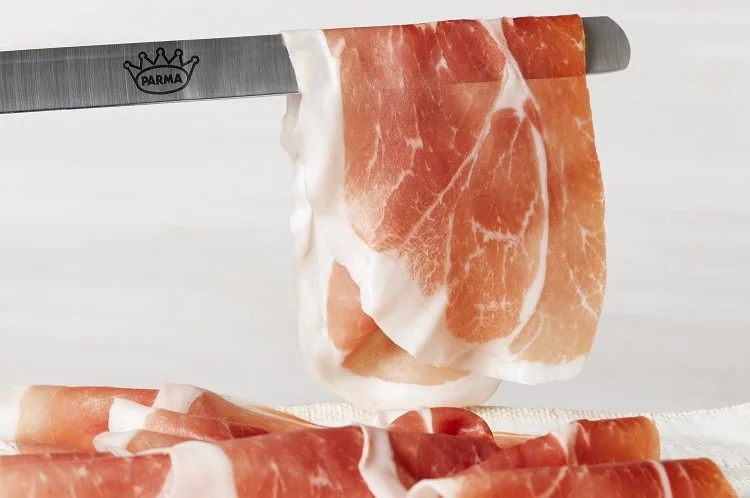What do you know about Prosciutto di Parma
Prosciutto di Parma is a type of dry-cured ham.
It Originates from the Parma region in Italy.
It is made from the hind legs of specially bred pigs that are raised according to strict regulations, including a diet of grains and whey from Parmigiano Reggiano cheese production.
The production process of Prosciutto di Parma involves salting the meat and letting it rest for a period of time, after which it is washed and dried. The ham is then aged for at least 12 months, developing its distinct flavor and texture.
Prosciutto di Parma is known for its delicate flavor.
Melt-in-your-mouth texture with a slightly sweet and nutty taste. It is typically served thinly sliced as an appetizer or antipasto and can also be used as a flavorful ingredient in pasta dishes, salads, and sandwiches.
Prosciutto di Parma should be stored in a cool, dry place.
Consumed within a few days of opening. It is a prized delicacy in Italian cuisine and is enjoyed worldwide as a gourmet ingredient.
What are the Prosciutto di Parma rules?
Prosciutto di Parma is a highly regarded Italian delicacy with specific regulations in place to ensure its quality and authenticity. The Consorzio del Prosciutto di Parma, the governing body for Prosciutto di Parma production, has established a set of rules that must be followed to produce genuine Prosciutto di Parma.
Here are some of the fundamental rules for producing Prosciutto di Parma:
Origin: Prosciutto di Parma must come from pigs raised and slaughtered in 11 central and northern Italy regions.
Breed: Only pigs of the Large White, Landrace, and Duroc breeds are allowed for Prosciutto di Parma production.
Diet: The pigs must be fed a special diet with whey from Parmigiano Reggiano cheese production and grains.
Salting: The legs of the pig are salted with sea salt for a specific amount of time, depending on the weight of the meat.
Resting: After salting, the meat is rested for a period of time to allow the salt to penetrate and preserve the meat.
Washing: The salt is then washed off, leaving the meat to dry.
Aging: The meat is then aged for at least 12 months in temperature-controlled rooms.
Branding: Only hams that meet the production standards are branded with the official Prosciutto di Parma mark, which includes the five-pointed ducal crown.
By following these rules, Prosciutto di Parma producers ensure that their product is of the highest quality and meets the strict standards required to bear the Prosciutto di Parma name.




